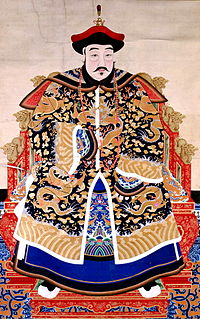- Dodo, Prince Yu
-
Dodo Uncle Who Assists in Governance
Prince Yu of the First RankPortrait of Dodo from the Palace Museum Archives Spouse Lady Borjigit
Lady Borjigit, concubine
Lady Nara, concubine
Lady Tunggiya, concubine
Lady Irgen Gioro, concubine
Lady Tunggiya, concubine
Lady Nara, concubine
Lady Giya, concubine
Lady Giya, concubine
Lady Nara, concubine
Lady Lang, concubinePosthumous name Tong 通 House House of Aisin Gioro Father Nurhaci Mother Lady Abahai Born 2 April 1614 Died 29 April 1649
BeijingDodo Traditional Chinese 多鐸 Simplified Chinese 多铎 Transcriptions Mandarin - Hanyu Pinyin Duōduó Dodo, Prince Yu (Manchu:
 ; 2 April 1614 – 29 April 1649) was a Manchu prince and military general of the early Qing Dynasty period of Chinese history.
; 2 April 1614 – 29 April 1649) was a Manchu prince and military general of the early Qing Dynasty period of Chinese history.Contents
Biography
Birth and family background
A member of the Aisin Gioro clan, Dodo was the fifteenth son of Nurhaci, founder of the Qing Dynasty. His mother was Lady Abahai, who also bore his two other full brothers, Dorgon and Ajige. His birth came on the twenty-fourth day of the second lunar month.
Career
Hong Taiji's reign
In 1620 Dodo was conferred the title of Lord of the First Rank (和碩額真). He became a beile (貝勒; lord) at the age of 13 and was put in charge of the Plain White Banner, and started administrating affairs in the Rites and War ministries. In 1628, Dodo followed Hong Taiji on the conquest of Chahar, Mongolia, and was granted the title of eerkechuhuer (額爾克楚虎爾) for his achievements. The following year, he followed Hong Taiji again on the conquest of the Ming Dynasty, crossing the Great Wall and closing in on the Ming capital of Beijing.
In 1631 Dodo was involved in besieging the Ming army at Daling River. He lost his footing and fell from his horse during a battle and almost died at Jinzhou. The following year he participated in a campaign against the Mongol Ligdan Khan of Chahar, and in 1635 he was appointed commander-in-chief for the first time at the Battle of Daling River.
In 1636 Dodo was granted the title of "Prince Yu of the First Rank" (和碩豫親王). He followed Hong Taiji on the campaign against the Korean Joseon Dynasty and defeated the enemy at Mount Nanhan. Two years later, he was demoted to doro beile (多羅貝勒) for bringing prostitutes with him in his army. In 1641, Dodo participated in the Battle of Songjin and led the Qing army in besieging Jinzhou in the first part of the battle. He led an ambush to wipe out the remnants of the enemy at Mount Song in the final battle and joined Hooge's forces in besieging Mount Song and captured the Ming commander Hong Chengchou. He was promoted to "Prince of the Second Rank" (多羅郡王) for his achievement.
Shunzhi Emperor's reign
In 1644 Dodo entered China proper after the Ming general Wu Sangui opened Shanhai Pass for the Qing armies. They defeated rebel forces under Li Zicheng at Shanhai Pass and occupied the Ming capital of Beijing, after which Dodo became a "Prince of the First Rank" (親王) and was appointed "Great General Who Pacifies the Nation" (定國大將軍). Together with Kong Youde (孔有德) and Geng Zhongming (耿仲明), Dodo led an army of 200,000, including both Manchu and Han Chinese troops, to attack Li Zicheng's remnants, defeating and driving the enemy from Henan to Shaanxi.
In the first month of 1645 Dodo conquered Tong Pass and Xi'an, and in the second month he attacked the Southern Ming Dynasty (remnants of the fallen Ming Dynasty). In the fourth month, Dodo captured the city of Yangzhou and executed its defending official Shi Kefa, after which he ordered the Yangzhou massacre to be conducted. By the following month Dodo's army had crossed the Yangtze River and occupied Southern Ming's capital of Nanjing and captured its ruler, the Hongguang Emperor. In the sixth month Dodo conquered Zhejiang and returned to Beijing, after which he received the title of "Prince Deyu of the First Rank" (和碩德豫親王).
In 1646 Dodo was appointed "Great General Who Spreads Might" (揚威大將軍) and emerged victorious from suppressing a rebellion by the Sonid Mongols. A year later, he was appointed "Uncle Prince Deyu of the First Rank Who Assists in Governance" (輔政叔德豫親王).
Death
Dodo died of smallpox on 29 April 1649 (the eighteenth day of the third lunar month) at the age of 36. Dodo was said to have a very close relationship with his brother Dorgon. Dorgon was attacking Jiang Xiang (姜瓖) in Shanxi when he heard that Dodo was severely ill, so he immediately turned and rushed back to Beijing, but when he arrived at Juyong Pass, he received news that Dodo had died. Dorgon was so grieved that he changed into plain robes and cried as he raced back to Beijing.
Posthumous demotion and restoration
In 1652 the Shunzhi Emperor posthumously demoted Dodo to "Prince of the Second Rank" (多羅郡王) for his affiliation with Dorgon, whom the emperor perceived to have had the intention of usurping the throne. In 1671 during the reign of the Kangxi Emperor, Dodo was granted a posthumous title of "Tong" (通). In the first lunar month of 1778, the Qianlong Emperor posthumously restored Dodo of his titles and created a place for Dodo in the Qing ancestral temple, and seven months later a shrine was built for Dodo in the Mukden Palace.
References
- Ebrey, Patricia (1993). Chinese Civilization: A Sourcebook. Simon and Schuster.
- Voices from the Ming-Qing Cataclysm: China in Tigers' Jaws, Struve, Lynn A. Publisher:Yale University Press, 1998 ISBN 0-300-07553-7, 9780300075533 312 pages
- Struve, Lynn A. "Voices from the Ming-Qing Cataclysm: China in Tiger's Jaws. London: Yale University Press, 1993.
- Liu Xiaomeng. "Twelve Princes of the Qing Dynasty" 正說清朝十二王. Zhonghua Publishers, 2006.
Categories:- 1614 births
- 1649 deaths
- Manchu people
- Qing Dynasty imperial princes
Wikimedia Foundation. 2010.

